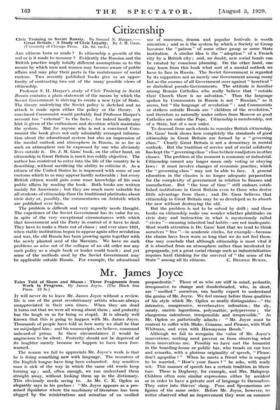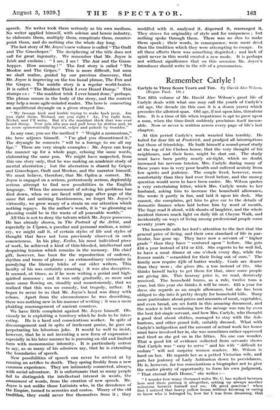Mr. James Joyce
IT will never do to leave Mr. James Joyce without a review. He is one of the great revolutionary artists who are always unappreciated in their own times. When they are dead it turns out that we were all wrong about them ; and posterity has the laugh on us for being so stupid. It is already well known that this is going to happen with Mr. James Joyce. Thousands of people have told us how sorry we shall be that we misjudged him ; and his manuscripts, we believe, command unheard-of prices. In these circumstances it would be ungracious to be silent. Posterity should not be deprived of its laughter merely because we happen to have been fore- warned.
The reason we fail to appreciate Mr. Joyce's work is that he is doing something new with language. The resources of the English tongue have long been exhausted. Any sensitive man is sick of the way in which the same old words keep turning up ; and, often enough, we can understand them Straight away, without looking them up in the dictionary. This obviously needs seeing to. As Mr. C. K. Ogden so elegantly says in his preface : "Mr. Joyce appears as a pro- raised liquidator where the machinery of literature has been clogged •by the ministrations and minutiae of an ossified
propaedeutic." Those of us who are stiff in mind, pedantic, irresponsive to change and dunderheaded, who, in short, are " ossified " ourselves, can hardly expect to understand the genius of Mr. Joyce. We feel uneasy before those qualities of his style which Mr. Ogden so neatly distinguishes—" the intensive, compressive, reverberative infixation ; the sly, meaty, oneiric logorrhoea, polymathic, polyperverse ; the clangorous calembour, irresponsible and irrepressible." As Mr. Ogden so pathetically admits : " Mr. Joyce must be content to suffer with Blake, Cezanne, and Picasso, with Walt Whitman, and even with Hieronymus Bosch."
Although we fail to recognize the value of Mr. Joyce's innovations, nothing need prevent us from observing what these innovations are. Possibly we have met the humorist in the boarding-house or public bar, who treads on our toes and remarks, with a glorious originality of speech, " Please, don't agopolize ! " When he meets a friend who is engaged to be married, " How's your fiasco ? " he asks, with ready wit. This manner of speech has a certain tradition in litera- ture. There is Dogberry, for example, and Mrs. Malaprop. Children often coin similar expressions either by accident or in order to have's private sort of language to themselves. They enter into thieves' slang. Puns and Spoonerisms are figures of the same order. Before Mr. Joyce, however, no Writer observed What an improvement they were on common
speech. No writer took them seriously as his own medium. No writer applied himself, with solemn and heroic industry, to elaborate them, multiply them, complicate them, counter- point them, and do nothing else the whole day long.
The last story of Mr. Joyce's new volume is called " The Ondt and The Gracehoper." The deciphering of the title does not call for great ingenuity. We remember that Mr. Joyce is Irish and exclaim : " I see, I see ! The Ant and the Grass- hopper. How amusing ! " The first story is called " The Mookse and The Gripes." This is more difficult, but soon we shall realize, guided by our previous discovery, that Mr. Joyce is improving on the too banal phrase, The Fox and the Grapes. The middle story is a regular world-beater. It is called " The Muddest Thick I ever Heard Dump." This stumps us : " the maddest trick I ever heard done," perhaps. The phrase occurs in the body of the story, and the context may help a more agile-minded reader. The hero is concocting an aquilittoral dryangle on a given strayed line.
" My faceage kink and kurkle trying to make keek peep. Are you right there, Michael, are you right ? Ay, I'm right here, Nickel, and I'll write. But it's the muddest thick that was ever heard dump. Now join alfa pea and pull loose by dotties and, to be more sparematically logoical, eelpie and paleale by trunkles."
In any case, you see the method ? " Weight a momentum," the hero adjures himself. " I'm glad you dimentioned it." The dryangle he concocts " will be a lozenge to me all my lipe." These are very simple examples : Mr. Joyce can keep the manner up for a whole page, echoing the same words, elaborating the same pun. We might have suspected, from this one story only, that he was making an academic study of mental aberration ; but the aberration is shared by Gripes and Gracehoper, Ondt and Mookse, and the narrator himself. We must believe, therefore, that Mr. Ogden is correct. Mr. Joyce is engaged on a serious, portentously serious, deplorably serious attempt to find new possibilities in the English language. When the amusement of solving his problems has died down, when we are faced with page after page of the
same flat and untiring facetiousness, we forget Mr. Joyce's virtuosity, we grow weary of a strain on our attention which nothing repays. In the author's words, it is "Was glooming as gloaming could be in the waste of all peaceable worlds."
All this is not to deny the talents which Mr. Joyce possesses. He has already shown, in The Portrait of the Artist, and especially in Ulysses, a peculiar and personal realism, a mimi- cry, we might call it, of certain styles of life and styles of thought that have not been previously observed in such concreteness. In his play, Exiles, his most individual piece of work, he achieved a kind of thin-blooded, intellectual and despairing tension which remains in the memory. His chief gift, however, has been for the reproduction of cadence, rhythm and turns of phrase ; an extraordinary virtuosity in parodying the literary tricks of our older writers. This faculty of his was certainly amazing : it was also deceptive. It seemed, at times, as if he were writing a genial and high- spirited nonsense ; and it was only gradually, as more and more came flowing on, steadily and monotonously, that we realized that this was no comedy, but tragedy, rather. It began to occur to us that Mr. Joyce's head was dizzy with echoes. Apart from the circumstances he was describing, there was nothing new in his manner of writing ; it was a mere plodding rearrangement of ancient counters.
We have little complaint against Mr. Joyce himself. Ob- viously he is exploiting a territory which he feels to be inter- esting. He is a hard and conscientious worker. In spite of discouragement and in spite of irrelevant praise, he goes on Perpetrating his laborious joke. It would be well to insist, however, that he is not inventing a new form of expression : especially in his later manner he is pursuing an old and limited form with monomaniac intensity. It is particularly untrue to say, as so many of his admirers say, that he is extending the boundaries of speech.
New possibilities of speech can never be arrived at by running an artifice to death. They spring freshly from a new common experience. They are intimately connected, always, with social adventure. It is unfortunate that so many people fail to distinguish the intellectual interest in words, the amusement of words, from the creation of new speech. Mr.
Joyce is not unlike those Latinists who, in the decadence of the Empire, turned to acrostics and centos. Weary of the old tradition, they could never free themselves from it ; they meddled with it, analysed it, dispersed it, rearranged it. They strove for originality of style and for uniqueness ; but nothing spoke through them. There was no elan to make them speak ; their words, in consequence, were more dead than the tradition which they were attempting to escape. In all these efforts there was something dispirited ; and lack of spirit never in this world created a new mode. It is perhaps not without significance that on this occasion Mr. Joyce's introducer should write in the role of a grammarian.



































 Previous page
Previous page